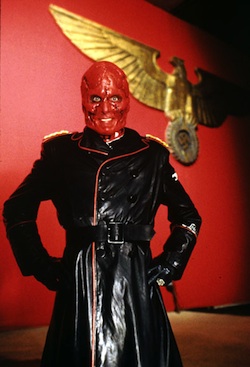The comic book movie used to be a laugh, B-list fodder meant for the five-dollar bin at the local convenience store and mentioned in the same breath as the dreaded video game film. The nineties were littered with poor excuses for comic film adaptations like Spawn, Steel, and Judge Dredd. Every once in a while, a diamond in the rough would poke it’s head out and remind us that good work could be done like Christopher Reeves’ Superman and Tim Burton’s gothic Batman. But overall, most of the movies were a cringe-fest hit or miss mess that plagued comic fans and non-geeks alike.
Then, somewhere along the line, comic book films started to suck a lot less. Sure, we’d get our horrible adaptations—everyone shudder with me as we consider Nic Cage’s multiple disastrous Ghost Riders. But Hollywood started to notice that if the right combination of factors came together, they could create a comic book gold mine. So what shifted? How did some studios get it right where others went horrifically wrong? Let’s take a look at some issues with comic book films and see how our favorites like The Dark Knight and The Avengers got things right.
Sometimes, Hollywood Just Doesn’t Get It
Comic book films come with a lot of baggage. An adaptation often involves a lot of information about the character’s origins, its universe and the heroes and baddies of the piece. While that’s a lot to manage, the film also has to pay homage to the original mood of the adapted comic. The adaptation has to strike the correct balance of fresh visual exploration of the material while still bringing along old fans by making them feel right at home with the themes of the original comic. If the tone of the original work isn’t translated, the comic movie can feel way off mark. It might be a decent film, but it won’t feel close to the original comic book. What’s a Batman movie without the brooding depth, the darkness and lost parent issues? Where’s Spider-Man without the eternal optimism and “great responsibility” routine? Without these elements, the movie comes off feeling out of touch with its roots.
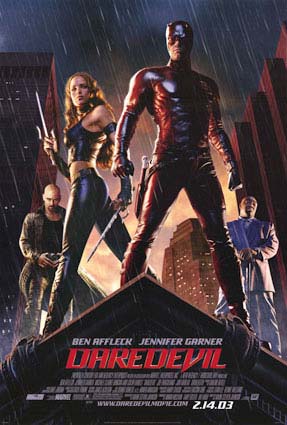
One perfect example of this mood-miss is the aforementioned Daredevil film and it’s equally disastrous spin-off film, Elektra. Daredevil is a complex character whose story has had many different writers at the helm. Yet when the film decided to deal with the story of Daredevil’s origin mixed with the grittier story of the master assassin/love interest character Elektra, the mood of the film got hopelessly muddled. Hollywood lost track of the dark aspects of the Elektra storyline in favor of a slick, spandex version of Daredevil in Ben Affleck and missed the darkness and loss at the heart of the “death of Elektra” story. That total disconnection from the source material continued in Jennifer Garner’s solo Elektra. The leading lady as written had no depth because the original subject material’s integrity wasn’t respected—they treated Elektra as a superhero rather than the complex killer she’s written to be. Other good examples of films so horribly off tone are b-list cringers like The Spirit (too tongue in cheek) and Judge Dredd (not gritty enough).
Why Rewrite a Classic?
Another issue in comic films is the rewrite process. Hollywood is notorious for taking something that works and twisting it around with “fresh” rewrites. Comic book films have tried rewrites to streamline overly complex story lines and origins. But there are some which have suffered massive overhauls that changed the fundamental story so severely that it was nigh unrecognizable to the original work. Bearing in mind that the original work was what would bring fans to a comic book movie in the first place, these huge rewrites make the films unrecognizable and almost always unpalatable.
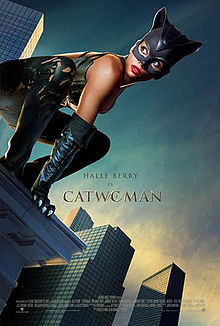
The frightful example of this is the nigh unwatchable Halle Berry nightmare Catwoman. The creators of this travesty shredded the original character of Catwoman like they shredded most of Berry’s costume. What they made was nowhere near anything that Catwoman fans might have recognized. The origin story changed from lady thief to a supernaturally created lady thief with a “cat-powered archetype” story that was so hokey as to be unbelievable and unnecessary. The audience came to see Catwoman—why not give them what they came for? Another example was the quickly murdered Wonder Woman pilot for television, which took the Amazonian princess and made her a corporate woman out to crime fight in her spare time, an Ally McBeal knock-off in a Halloween costume. Once again, creators lost sight of their original source material in the rush to rewrite what had originally made the name behind the film a classic. Other honorable mentions for bad choices in the rewrite of Watchmen‘s big climactic ending and the rewrite of Doctor Doom as a villain in the Fantastic Four.
Sequels are A Great Idea, Right?
It’s difficult to make quality sequels. Unless you’re Empire Strikes Back or The Godfather Part II, it’s difficult not to create an inferior product the second or third time around. Yet comic book movies like X2 and Blade 2 have honored what came before them with great follow-up films. I use these two franchises as examples, however, because what came after these great sequels are two disastrous creations that tried really hard to deliver and flunked passing grades by far. X-Men: The Last Stand and Blade Trinity are two examples of films that didn’t follow the good practices set by the original films and instead get lazy, or overly complex, in favor of trying “something new.”
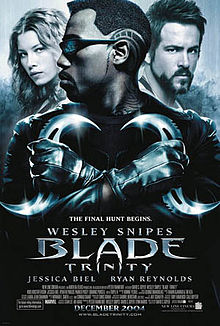
The Batman films of the 90’s are a wonderful example of this problem. Tim Burton presented fans with a dark and twisted Gotham City and a brooding Batman in the form of Michael Keaton opposite Jack Nicholson’s The Joker. He then followed that up with an equally twisted Batman Returns featuring The Penguin and Catwoman, with both films feeling like a coherent universe. What came next, however, went right off the rails into psychedelic territory with Batman Forever and Batman and Robin. Sure, it was a new director and a new vision, but fans had embraced the darker Bat of Burton’s world and what came after threw the entire franchise off a bridge into day-glo paint and wacky Jim Carrey hijinx. Another classic example of this is the classic Superman films, which go progressively stranger from Superman 1 and 2 into the weirdness of Superman 3. A super computer? Richard Pryor? What a mess. Or how about Spider-Man 3 and the Peter Parker dance number that put the final nail in the Toby Maguire Spidey run? The only way to rescue these franchises have been by wielding the mighty power of reboot, for mixed results.
Reboots, Retellings and Rescues: The New Comic Films
From the ashes of these failed former films, a new breed of comic film has arisen. Careful creative folks with an eye for tone, consistency, good filmmaking and fan-care have taken up the flag of new comic lines and those previously murdered by bad production. X-Men: First Class revamped the X-Men franchise after it’s descent into The Last Stand. Marvel picked up Captain America from where he’d been left in terrible made-for-TV movies and gave him his own wonderful film that lead us into the stunning success of The Avengers. And Christopher Nolan bid fans forget about batsuits with nipples on them in favor of his carefully crafted Dark Knight. It’s hard not to see these directors as careful craftsman, viewing what went wrong before and improving upon those mistakes for the future.
And in the process, going from this…
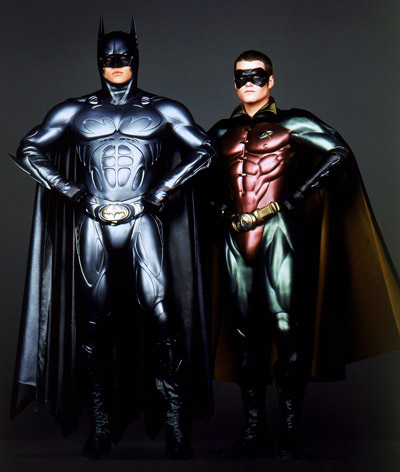
…to this.
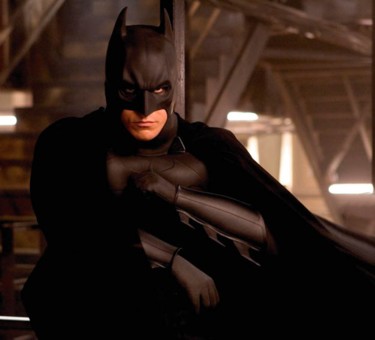
It’s hard not to see the improvement.
Sure, there have been hits and misses. The Superman retelling didn’t quite save the Man of Steel from a bad movie and Nicholas Cage just can’t quite get past having a horrible Ghost Rider movie, no matter how many times he tries. There are misses galore with tone in Green Lantern due to what can only be called poor filmmaking choices all around. But the trend overall seems to be heading towards creative, careful comic book films that know the formula for success and honor the fandoms they come from. And the success can be charted at the box office, in full theaters and packed midnight showings, not to mention Academy Award nominations.
This is a glorious time to be a comic book fan. Comic geeks can watch their heroes taken to the screen by trustworthy creators who give it their all to provide glorious, epic and well-thought out creations that respect their fandoms. Stay tuned to the silver screen, my comic geek brethren, it’s a great time to go to the movies.
Who knows? If they keep trying, maybe they’ll even get The Fantastic Four right. They say reboots the charm, after all.
Except for Ghost Rider. Sorry Nic Cage, I don’t know what might save that.
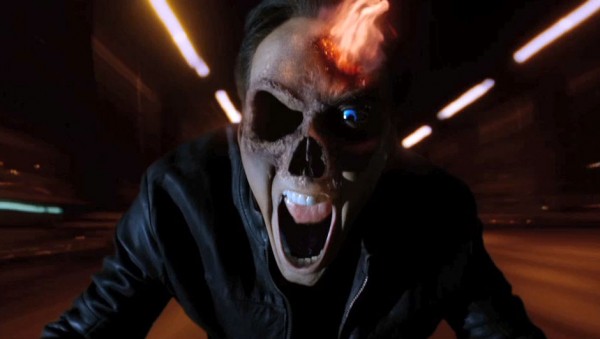
Shoshana Kessock is a comics fan, photographer, game developer, LARPer and all around geek girl. She’s the creator of Phoenix Outlaw Productions and ReImaginedReality.com










